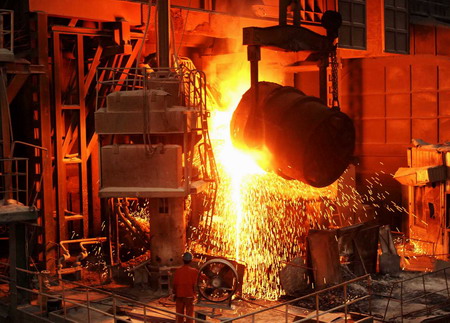ISLAMABAD: As the Ministry of Commerce (MoC) is going to introduce a “rationalisation of tariff” for various industries, the steel industry fears huge losses and even its closure in case the proposed tariffs are implemented.
The new tariff structure is reportedly being introduced by the National Tariff Commission (NTC). Two separate committees of MoC and the Ministry of Industries and Production (MoIP) were previously working on rationalising tariff.
In separate letters sent to MoC and MoIP on Monday, the Pakistan Large Scale Steel Producers (PALSP), which represents over 60 per cent of the primary steel output of Pakistan, has informed that the proposed changes in tariff lines related to steel products would ultimately lead to the closure of steel factories in the country.
It has been informed to the ministries that over 200 units are engaged in the primary steel manufacturing with a combined capacity of over 4 million tonnes. This sector generates approximately Rs100 billion in government revenue, provides direct employment for over 55,000 people, and is the sole supplier of steel to the construction industry. Without long steel products, steel bars, and sections, not even one square foot of construction can take place.
“We would like to inform the government that if any duties (CD, ACD, RD) on long steel products including steel billets, bars, wire rod, and structures are reduced, our members will be forced to close factories, resulting in mass unemployment, reduction in revenue generation and a sharp decline of domestic steel supply to the construction industry,” the letters quoted the association as having said.
According to PALSP, at a time when the cost of doing business is skyrocketing and steel industry margins are negative, reducing import tariffs on intermediate or finished products is a clear sign from the government that they want to de-industrialise the domestic steel sector and be dependent on imports that will increase the foreign exchange burden by over $ 1 billion per year.
The association has asked the government to commit to a cascading tariff structure to avoid market distortions. “The import duties on re-rollable material (PCT Code 7204.4910) have to be increased to 22pc as it is an intermediate good that currently attracts import tariffs equal to the primary raw material of the industry. Moreover, steel made from re-rollable material violates standards of the Pakistan Standard Quality Control Authority (PSQCA), cannot be produced and marketed and undercuts the formal sector.”
On the one hand, the government talks cascading tariff structures and growth in exports but on the other, they cannot make the decisions to support the quality-oriented and documented steel sector that has made the bulk of the investments over the past few decades,” the association further said.
PALSP further states, “The need of the hour is liquidity. We have billions of rupees stuck up with FBR in sales tax adjustments due to double taxation. Customs is refusing to abolish an Import Trade Price (ITP) value on steel scrap that is much higher than actual transactional values, forcing companies to pay unnecessarily high taxes at the import stage.”
At a time when the industry is making heavy losses, the minimum turnover tax should be abolished to ease pressure on cash flow and the interest rate should be reduced to 5pc when countries across the world have slashed rates to 0pc, the association further suggests to the government.




